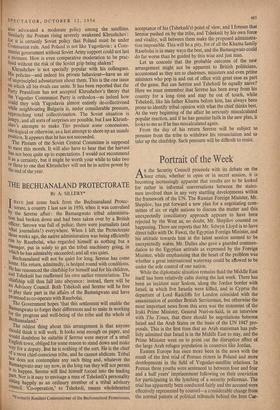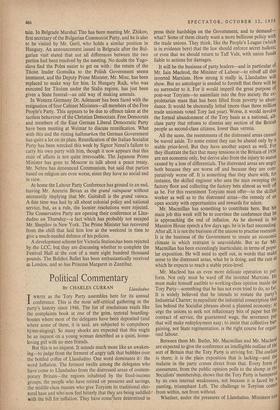Portrait of the Week
As the Security Council proceeds with its debate on the As crisis, whether in open or in secret session. it is becoming increasingly apparent that results are to be looked for rather in informal conversations between the states- men involved than in any very startling developments within the framework of the UN. The Russian Foreign Minister, Mr. Shepilov, has put forward a new plan for a negotiating com- mittee of six or eight nations to discuss the matter and this unexpectedly conciliatory approach appears to have been rejected by the West as, no doubt, Mr. Shepilov counted on happening. There are reports that Mr. Selwyn Lloyd is to have direct talks with Dr. Fawzi, the Egyptian Foreign Minister, and his attitude towards him at the latest session seemed to be unexpectedly warm. Mr. Dulles also gave a guarded commen- dation to the Egyptian attitude as expressed by the Foreign Minister, while emphasising that the heart of the problem was whether a great international waterway could be allowed to be under the sole control of one nation.
While the diplomatic situation remains fluid the Middle East itself has been relatively calm during the last week. There has been an incident near Sodom, along the Jordan border with Israel, in which five Israelis were killed, and in Cyprus the departure of Lord Radcliffe for London coincided with the assassination of another British Serviceman, but otherwise the most important news from this area was the statement of the Iraki Prime Minister, General Nuri-es-Said, in an interview with The Times, that there should be negotiations between Israel and the Arab States on the basis of the UN 1947 pro- posals. This is the first time that an Arab statesman has pub- licly admitted that Israel is in the Middle East to stay, and the Prime Minister went on to point out the disruptive effect of the large Arab refugee population in countries like Jordan.
Eastern Europe has once more been in the news with the result of the first trial of Poznan rioters in Poland and more developments in the field of Yugoslav-satellite relations. In Poznan three youths were sentenced to between four and four and a half years' imprisonment following on their conviction for participating in the lynching of a security policeman. The trial has apparently been conducted fairly and the accused were effectively represented by counsel—a considerable change from the normal pattern of political tribunals behind the Iron Cur- tain. In Belgrade Marshal Tito has been meeting Mr. Zhikov, first secretary of the Bulgarian Communist Party, and he is also to be visited by Mr. Gero, who holds a similar position in Hungary. An announcement issued in Belgrade after the Bul- garian visit stated that not all differences between the two parties had been resolved by the meeting. No doubt the Yugo- slays find the Poles easier to get on with : the return of the Titoist leader Gomulka to the Polish Government seems imminent, and the Deputy Prime Minister, Mr. Minc, has been replaced to make way for him. In Hungary Rajk, who was executed for Titoism under the Stalin regime, has just been given a State funeral—an odd way of making amends.
In Western Germany Dr. Ad'enauer has been faced with the resignation of four Cabinet Ministers—all members of the Free People's Party. This appears to be due to offence taken at the tactless behaviour of the Christian Democrats. Free Democrats and members of the East German Liberal Democratic Party have been meeting at Weimar to discuss reunification. What with this and the rioting halbstarken the German Government has quite a lot on its plate. Reunification of the Italian Socialist Party has been wrecked this week by Signor Nenni's failure to carry his own party with him, though it now appears that this state of affairs is not quite irrevocable. The Japanese Prime Minister has gone to Moscow to talk about a peace treaty. Mr. Nehru has denounced Communism, but said that parties based on religion are even worse, since they have no social end in view.
At home the Labour Party Conference has ground to an end, leaving Mr. Aneurin Bevan as the grand vainqueur without necessarily implying that Mr. Gaitskell is the grand vaincu. A fine time was had by all about colonial policy and national service, but, as a rule, the loonier resolutions were rejected. The Conservative Party are opening their conference at Llan- dudno on Thursday—a fact which has probably not escaped Mr. Shepilov in New York. The Prime Minister has recovered from the chill that laid him low at the weekend in time to give a much-needed defence of his policies.
A development scheme for Victoria Station.has been rejected by the LCC, but they are discussing whether to complete the Festival Hall at the cost of a mere eight hundred thousand pounds. The Bolshoi Ballet has been enthusiastically received in London, and so has Princess Margaret in Zanzibar.











































 Previous page
Previous page